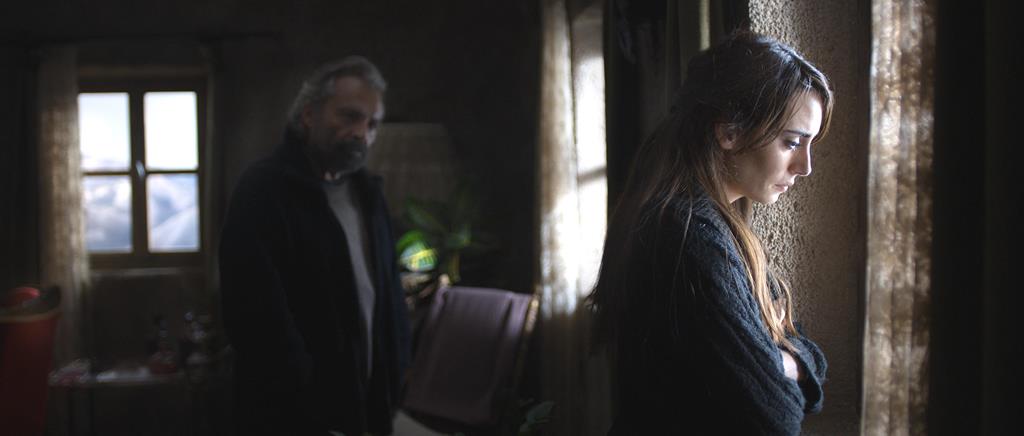Nuri Bilge Ceylan’s sterling reputation bolstered expectations in advance of his three-hour-plus “Winter Sleep” screening in competition today. A favorite of critics worldwide, the Turkish director has an unbroken string of Cannes awards for his four previous films screened here, including 2011’s “Once Upon a Time in Anatolia.”
For reasons known only the festival, only one screening of this epic-length work was scheduled, combining the press screening and the red carpet premiere all in one. The audience was admitted an hour in advance, and interest was so keen that the huge theater was almost full with forty-five minutes to go. Many critics were shocked to be locked out.
Ceylan and his cast, wearing black lapel ribbons in commemoration of this week’s Turkish mine tragedy that killed hundreds, observed a somber moment of silence at the top of the steps before entering the Palais. The stage was set for a triumph, but that sort of acclaim was not to be.
I count myself among the admirers of Ceylan’s past films, but “Winter Sleep” left me puzzled and unsatisfied by a film that talked itself in circles with a somewhat Chekhovian approach to class divisions, moral despair, and the characters’ extensively verbalized dissatisfaction with their lot in life. Ceylan is a director who makes very deliberate use of duration but the payoff in terms of meaning is usually worth the wait. That payoff never materialized in this film as it did, for instance, following the approximately forty-five minute-long police search in almost total darkness that opens “Once Upon a Time in Anatolia.”

“Winter Sleep” centers on Aydin, a former actor, now a wealthy man, who operates a small tourist hotel in a remote but picturesque Anatolian location characterized by steep cone-like cliffs. He lives with his much younger wife Nihal and his recently divorced sister Necla. Aydin collects rent on small village properties, and is portrayed as a hard, self-satisfied and self-centered man where money is concerned.
Much of “Winter Sleep” takes place in small, cave-like rooms lit only by lamps or firelight, and where exposition takes the form of lengthy bitter arguments over moral questions. The first third of the film belongs to sister Necla, whose needling harangue on her brother’s flaws reaches a level of annoyance that begs for relief.
Rather than relief, Ceylan launches news assaults in the form of accusatory, tear-inducing arguments between husband and wife over issues of control, autonomy, and lost opportunities in life. Aydin’s departure from the scene only brings him to a new, louder and more layered round of confrontations involving an old friend and the village schoolteacher during an evening of heavy drinking.
A thread of speculation on what constitutes moral behavior and justice runs through the film, but this is addressed almost entirely in the form of incessant dialogue. One aspect of the plot in which Nihal attempts to redress the wrong she feels her husband has done to a family of tenants sticks out as something that doesn’t quite connect stylistically with the rest of the story. An image of a wild horse cruelly brought to its knees in the course of capture is powerfully injected early in “Winter Sleep,” but it’s the metaphor that got away in terms of making the film work on a higher plane.

Real comedies are a rarity in competition at Cannes, but today ended with a crowd-pleaser: “Wild Tales” (aka “Relatos Salvajes”) by Damian Szifron, an Argentinian-Spanish co-production. This episodic film has a gargantuan sense of irony, and the fact that Pedro Almodovar is one of the producers makes complete sense in light of the film’s macabre and funny sense of absurdity.
The prologue sequence got the audience in its grip and spontaneously applauding over a tasty teaser of a tale involving a group of airline passengers who discover with dire consequences that they all know the man now piloting their plane. The episodes are snappy, dark, and hilarious, involving revenge, murder, and wishful thinking put into action.
Especially sharp is the audacious little story of a guy who gives a fellow driver the finger on a twisting mountain road, only to discover that he needs help a few miles on. This one keeps slamming on the surprises. The director keeps one-upping himself with escalating mayhem that had the audience roaring with approval, indicating that this is a film that will likely have a long life on the world market, whether or not it wins a prize in Cannes.
Don’t miss the following special events at the festival:
Screening of “LIFE ITSELF,” in Cannes Classics: Monday, May 19, at 5 pm in Bunuel.
IN CONVERSATION with Steve James and Chaz Ebert about “Life Itself,” at the American Pavilion, Wednesday, May 21 at 11 am.
THE ROGER EBERT FILM CRITICS PANEL: at the American Pavilion, Thursday, May 22 at 3 pm. Moderated by Michael Phillips (Chicago Tribune), including Eric Kohn (Indiewire), AA Dowd (The Onion AV Club), Wesley Morris (Grantland), Keith Simanton (IMDB), and Allison Willmore (Buzzfeed).












